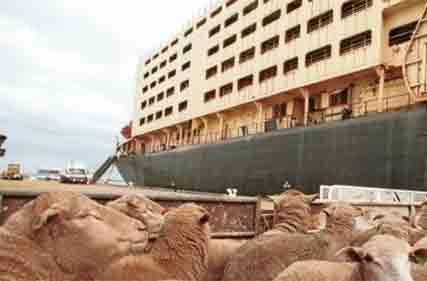 The NSW Department of Primary Industries and Regional Development (DPIRD) has debunked industry claims of major impacts on the NSW industry due to the phase out of live sheep exports.
The NSW Department of Primary Industries and Regional Development (DPIRD) has debunked industry claims of major impacts on the NSW industry due to the phase out of live sheep exports.
In a submission to the NSW Upper House inquiry into the impacts of the phase out of live sheep exports, agri-political lobby group NSW Farmers claimed that it would cost the NSW industry millions and reduce sheep prices due to a supposed oversupply of WA sheep moving across the Nullarbor.
“Whether you’re producing sheep in western NSW or Western Australia, you will be dramatically affected” the lobby group claimed in a media statement released on the day of the inquiry hearing.
However, DPIRD executives contested the lobby group’s claims, telling the inquiry they had a “difference of opinion on the economic modelling” and describing the likely impacts of the phase out as “small and short term”.
In fact, the perceived impacts were so small, DPIRD did not believe a submission to the inquiry was warranted.
Group Director of Livestock Systems Dougal Gordon outlined six factors underpinning the Department’s assumptions, including the small and declining volumes involved in the live export trade – “even if all sheep exported live by WA were transported east, this would represent only 1.6% of eastern States’ annual turn-off.”
“Given the size of that eastern seaboard market…the numbers aren’t material or not material enough to make a significant impact upon sheep prices,” Mr Gordon explained.
When questioned over the decline in merino-based wool producing sheep, Mr Gordon downplayed the role of live exports, saying:
it’s certainly happening more broadly across Australia. But that’s been happening since the actual closure of the reserve price scheme in 1998. This has been happening for some time; it’s just an extension of current supply and demand fundamentals.
Mr Gordon also commented on “historical highs” in sheepmeat exports – “our sheepmeat exports have increased by 17.2 per cent over the past 10 years. That has largely offset the decline in the live sheep export trade.”
Alliance for Animals Policy Director Dr Jed Goodfellow said it was refreshing to hear the Department’s frank and fearless advice.
“There is so much fearmongering coming from the agri-political groups on this issue, it is difficult for farmers to sort fact from fiction,
“DPIRD has done everyone a favour by injecting some sense back into the debate,
“Claims of a pending catastrophe were shot down in flames by DPIRD officers, along with the credibility of the groups purveying them,
“The reality is, there is currently record investment – both private and public – going into boosting the WA sheep industry and supporting the transition,
“This will lead to significant job creation and value-adding in local Australian supply chains,
“It’s time for industry groups to drop the political scare campaign and move into the 21st century by supporting humane and sustainable forms of farming.”
